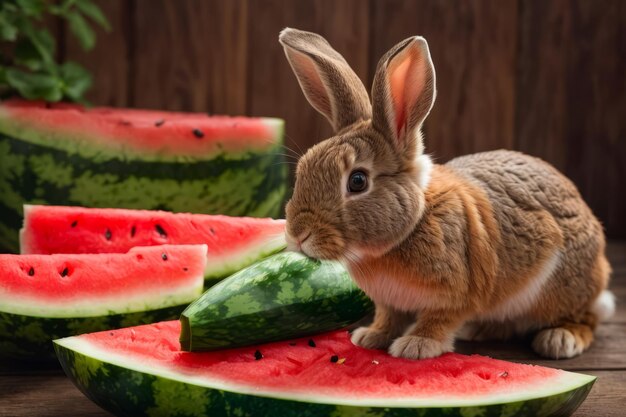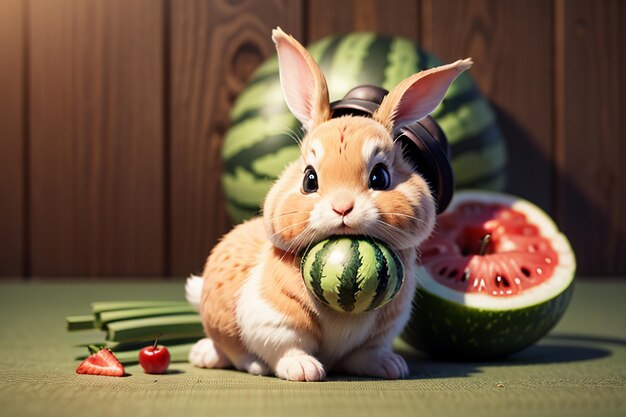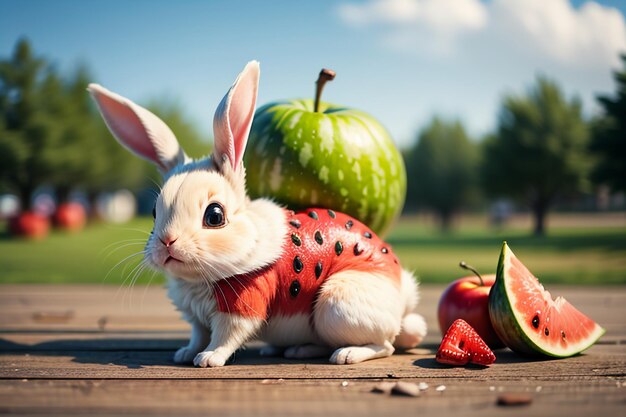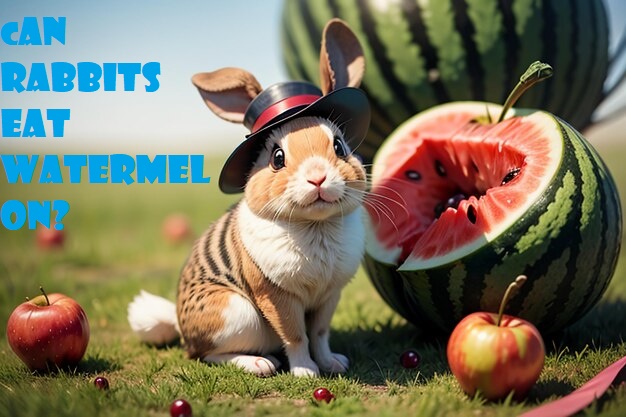Are you a proud owner of a fluffy and adorable rabbit? If so, you may wonder if your furry friend can join the fun of eating watermelon in the summertime.
Can rabbits eat watermelon! This juicy and sweet fruit is not only safe for rabbits to consume, but it also offers several health benefits. However, there are some safety facts and tips to remember when feeding your rabbit watermelon.
In this blog post, we’ll explore the question, “Can rabbits eat watermelon?” and provide all the necessary information to ensure your rabbit’s well-being. So, let’s hop right into it!
Did you know Can Rabbits Eat Pineapple? Check this!!
Can Rabbits Eat Watermelon?
If you’ve ever found yourself munching on a slice of juicy watermelon during the summer, you might have wondered if your rabbit can join in on the refreshing treat. Well, the answer is a resounding yes!
Rabbits can indeed eat watermelon and might love it as much as you do. Watermelon is a safe and healthy fruit for rabbits to consume, but as with any new food, there are a few things to consider.
Firstly, moderation is key. While watermelon is a delicious and hydrating snack, it should only be given to your rabbit in small amounts as an occasional treat. Too much watermelon can upset their digestive system due to its high sugar content. When feeding watermelon to your furry friend, remove the seeds and rind.
Seeds can be a choking hazard, and the skin can be problematic for rabbits to digest. Stick to feeding them the fruit’s juicy flesh, and your rabbit will be one happy camper.
Watermelon also provides some health benefits for rabbits. It is packed with vitamins A and C, essential for maintaining a healthy immune system and promoting good vision.

The Health Benefits of Watermelon for Rabbits
Watermelon can be a tasty treat for rabbits, but it should be given in moderation due to its high sugar content. Here are five potential health benefits:
Hydration:
Watermelon is not only a delicious summer treat for humans but can also help keep your rabbit hydrated. With its high water content, watermelon can provide a refreshing boost of hydration, especially during hot summer months.
Rabbits have a sensitive digestive system; proper hydration is crucial for their overall health and well-being. Rabbit dehydration can lead to various health issues, including urinary tract problems and gastrointestinal stasis. Providing your rabbit with juicy watermelon can help them stay hydrated and maintain a healthy digestive system.
One of the benefits of watermelon is that it is mostly water, making it an excellent choice for keeping your rabbit’s hydration levels in check. You can offer your rabbit watermelon in small, bite-sized pieces or freeze it for a cool summer treat. Just make sure to remove the seeds and rind before serving.
Remember, while watermelon can help hydrate your rabbit, it should not be the sole source of their water intake. Fresh, clean water should always be available to them as well. So, next time you enjoy a slice of juicy watermelon, share some with your rabbit. They’ll appreciate the hydration boost and enjoy the sweet and refreshing treat.
Vitamins and Antioxidants:
Watermelon is a delicious and refreshing rabbit treat, offering essential vitamins and antioxidants. This juicy fruit is packed with vitamin A, vital in maintaining a healthy immune system and promoting good vision in rabbits.
Additionally, watermelon contains vitamin C, another powerful antioxidant that helps protect cells from damage and supports overall immune health. By adding watermelon to your rabbit’s diet in moderation, you’re giving them a tasty treat and these essential vitamins and antioxidants for their overall well-being.
Digestive Health:
Regarding rabbits’ digestive health, watermelon is a double-edged sword. While the fruit’s juicy flesh can provide hydration and a tasty treat, it’s important to remember that rabbits have sensitive digestive systems. Watermelon is high in sugar, and too much sugar can disrupt the delicate balance of your rabbit’s digestive system, potentially leading to issues like diarrhea or bloating.
Feeding watermelon in moderation and monitoring your rabbit’s response is essential. If you notice any digestive upset, limiting or avoiding watermelon altogether is best. Always prioritize your rabbit’s digestive health when introducing new foods.
Enrichment and Mental Stimulation:
Enrichment and mental stimulation are crucial for the overall well-being of rabbits. As social and curious animals, rabbits thrive when provided with various forms of mental and physical engagement. So, how does watermelon fit into the picture? Offering watermelon as a treat can provide enrichment and mental stimulation for your fluffy friend. Think of it as a form of environmental enrichment.
Rabbits enjoy exploring and foraging for food, and the juicy flesh of watermelon can offer them a fun and interactive eating experience. You can get creative with how you present the watermelon to your rabbit.
Consider slicing the fruit into small, bite-sized pieces and scattering them in their play area. This will encourage your rabbit to hop around, sniff the treats, and engage in physical activity. It’s like a scavenger hunt for their taste buds!
Additionally, you can freeze watermelon chunks and offer them as a refreshing summer treat. This provides a cooling sensation for your rabbit and adds an extra level of mental stimulation. They’ll have to figure out how to tackle the frozen treat and work their way through it, keeping their minds active and entertained.

Safety Facts and Concerns
While watermelon is generally safe for rabbits to eat, there are a few safety facts and concerns to remember when feeding your furry friend this fruit.
- Moderation: As mentioned earlier, moderation is essential when feeding rabbits watermelon. While they may enjoy the sweet and juicy taste, too much can upset their delicate digestive system due to the high sugar content. Stick to small amounts as an occasional treat to avoid any potential issues.
- Remove seeds and rind: Always remove the seeds and rind before feeding watermelon to your rabbit. Seeds can be a choking hazard, and the rind can be difficult for rabbits to digest. Stick to feeding them the fruit’s juicy flesh, and your rabbit will be safe.
- Allergies and sensitivities: While rare, some rabbits may have allergies or sensitivities to watermelon. Look for signs of adverse reactions, such as diarrhea, gas, or bloating. If you notice any of these symptoms, it’s best to avoid feeding watermelon to your rabbit in the future.
- Pesticides and chemicals: When purchasing watermelon for your rabbit, opt for organic or pesticide-free varieties. This ensures you’re not exposing your rabbit to harmful chemicals or pesticides that could harm their health.
- Introduce gradually: If you’re feeding watermelon to your rabbit for the first time, it’s important to introduce it gradually. Start with a small amount and monitor their reaction. You can gradually increase the amount over time without adverse side effects.
Keeping these safety facts and concerns in mind ensures your rabbit can safely enjoy the delicious and hydrating watermelon treat. Always prioritize their health and well-being when introducing new foods into their diet.
Understanding a Rabbit’s Diet
Understanding a rabbit’s diet is essential for their health and well-being. These fluffy creatures thrive on a diet mainly of hay, which should make up most of their food intake. Fresh vegetables like leafy greens and carrots also play a crucial role in providing essential nutrients and hydration.
However, it’s vital to introduce new foods gradually to prevent digestive issues. Pellets formulated specifically for rabbits can supplement their diet but should be given in moderation. Ensuring a balanced and varied diet is vital to keeping these adorable creatures healthy and happy.
Tips For Feeding Watermelon to Your Rabbit
Feeding your rabbit watermelon can be a fun experience for both of you. Here are some tips to ensure a safe and enjoyable feeding session:
- Start with small amounts: Introduce watermelon gradually to your rabbit’s diet. Before offering more, begin with a small piece and observe how your rabbit reacts.
- Remove seeds and rind: Always remove the seeds and rind before feeding watermelon to your rabbit. This will prevent any potential choking hazards or digestive issues.
- Monitor for allergies or sensitivities: Keep an eye out for any signs of allergies or sensitivities, such as diarrhea or bloating. If any adverse reactions occur, discontinue feeding watermelon to your rabbit.
- Choose organic or pesticide-free varieties: Opt for organic or pesticide-free watermelons to avoid exposing your rabbit to harmful chemicals or pesticides.
- Feed in moderation: While watermelon is a delicious treat, remember to offer it in moderation. Too much can upset your rabbit’s digestive system due to its high sugar content.
By following these tips, you can ensure a safe and enjoyable experience when feeding watermelon to your rabbit. Happy feeding!

Types of Watermelon to Feed Your Rabbit
You can choose from a few different types when feeding your rabbit watermelon. Here are a few options:
Seedless Watermelon:
Seedless watermelon is popular for rabbits because it eliminates the need to remove the seeds. This makes it easier and safer to feed your furry friend. Just be sure to still deduct the rind before serving.
Mini Watermelon:
Mini watermelons are more miniature and perfect for rabbits needing more regular-sized watermelons. These can be a convenient option if you have a smaller rabbit or want to avoid wasting excess watermelon.
Organic Watermelon:
Choosing organic watermelon can be a great option to avoid exposing your rabbit to pesticides and chemicals. Organic watermelons are grown without synthetic fertilizers or pesticides, making them safer for your furry friend.
Remember, no matter which type of watermelon you choose, remove the seeds and rind before feeding them to your rabbit. Stick to small, bite-sized pieces of the juicy flesh and feed in moderation. Your rabbit will appreciate the variety and enjoy watermelon’s refreshing and sweet taste.
FAQs
Can rabbits eat watermelon seeds?
No, feeding watermelon seeds to rabbits is not recommended. The seeds can be a choking hazard and cause digestive issues if ingested. Permanently remove the seeds before offering watermelon to your rabbit.
How often can rabbits eat watermelon?
Watermelon should only be given to rabbits as an occasional treat. It should not be a regular part of their diet. Moderation is vital to prevent any digestive upset due to the high sugar content in watermelon. Stick to small amounts of watermelon and offer it as a special treat.
Can rabbits eat watermelon rind?
No, rabbits should not eat the watermelon rind. The rind can be difficult for them to digest and may cause gastrointestinal issues. Only feed your rabbit the fruit’s juicy flesh and discard the rind.
Are there any alternatives to watermelon for rabbits?
There are several safe and healthy alternatives to watermelon for rabbits. Some options include strawberries, apples (without seeds), and leafy greens like kale or romaine lettuce. Always introduce new foods gradually and monitor your rabbit’s response.
Can baby rabbits eat watermelon?
A: Feeding watermelon to baby rabbits is generally not recommended. Their digestive systems are more sensitive, and the high sugar content in watermelon may cause digestive issues. Consult a veterinarian before introducing baby rabbits to watermelon or any other new food.
Remember, it’s essential to prioritize your rabbit’s health and well-being when feeding them watermelon or any other treat. If you have any further questions or concerns, it’s always best to consult a veterinarian specializing in small animals.
Conclusion
In conclusion, Can rabbits eat watermelon? This juicy fruit offers several health benefits, including hydration, vitamins, and antioxidants. By feeding watermelon to your rabbit in moderation, you can help keep them hydrated, support their immune system, and promote good vision.
However, it’s important to remember the safety facts and concerns associated with feeding watermelon to your furry friend. Remove the seeds and rind, be mindful of allergies and sensitivities, and opt for organic or pesticide-free varieties.
Additionally, introducing watermelon gradually and monitoring your rabbit’s response is essential. Lastly, remember to have fun and provide some enrichment and mental stimulation for your rabbit by offering watermelon in different forms and creating a scavenger hunt-like experience.

